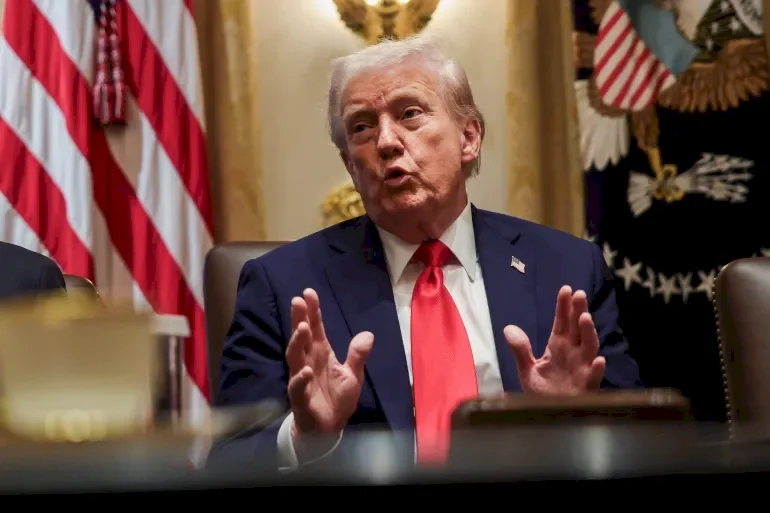
Thomas Friedman Commends Trump and Warns of What Awaits After Gaza Agreement
SadaNews - In his article in the New York Times, the prominent American writer and analyst supportive of Israel, Thomas Friedman, offered an optimistic yet cautious reading of the efforts led by President Donald Trump to halt the war in Gaza.
Friedman considered that the success of the first phase of Trump's plan, which includes a ceasefire and the exchange of prisoners and detainees, deserves global praise for three main reasons that could impact the future of both the Middle East and the United States.
The first of these reasons, according to the writer, is that reaching this point required exceptional diplomatic effort in a highly complex region. Trump and his team had to gain the trust of multiple parties simultaneously: Israel, the Islamic Resistance Movement (Hamas), Qatar, Turkey, Saudi Arabia, Egypt, the UAE, and the Palestinian Authority.
A Beginning Only
The second reason, as Friedman explains, is that this step is merely the beginning of a multi-phase peace plan, the actual implementation of which will be much more challenging. The Trump administration is required to oversee the disarmament of Hamas, establish a multinational security force to fill the vacuum left by Israel's withdrawal, fully reconstruct devastated Gaza, and form a transitional government to manage the sector, the writer clarifies.
He believes that this will require continuous involvement from Trump throughout his presidency for the plan to be successfully completed, warning the American president against exaggerating when he claims that he "ended the war in Gaza and achieved eternal peace," as this might indicate a misjudgment of the scale of upcoming challenges.
However, the writer emphasizes that the success of the project until its conclusion could reopen the door again to the two-state solution, within a new formula that combines Palestinian, Arab, and international sponsorship for Gaza's future, and possibly later extends to the West Bank.
Friedman has a history of sharply criticizing the American president in his previous articles, but this time he praised his negotiating style, describing it as "unique."
The third reason that makes Friedman wish that credit for engineering this peace plan is attributed to Trump has nothing to do with the Middle East, but stems from a hope -"perhaps flimsy"- that it might inspire him to make peace in America as well.
The writer believes that Trump's plan represents a new model for addressing the conflict, based on the fact that Israelis and Palestinians have lost the ability to reach peace on their own after the collapse of trust between them, and that achieving stability will require enduring guarantees from the United States and Arab countries.
Friedman analyzes Trump's unconventional negotiating style, which is based on pure pragmatism and indifference to moral values. In his view, he does not care about classifying regimes or holding them accountable for their human rights records, but focuses solely on results.
In terms of outcomes, Friedman sees that both Hamas and Israeli Prime Minister Benjamin Netanyahu, who is wanted by the International Criminal Court on charges of war crimes and crimes against humanity, will present the agreement as an achievement for them, even though neither has attained what they wanted.
Netanyahu Lost
In the American writer's view, Netanyahu lost his bet after relying entirely on Trump and losing all his other allies.
When Trump redirected his plan towards a genuine peace course that prevents the annexation of Gaza or the West Bank, Netanyahu had no leverage left.
The writer cites Israeli expert Gideon Greinstain, who described Trump's 20-point plan as a "pivotal opportunity to revive the fundamental principles that diplomacy was built upon since the Camp David Accords."
According to him, it reaffirms the illegitimacy of unilateral annexation and gives Palestinians a political horizon towards self-determination and political separation from Israel.
Although the writer has regularly directed sharp criticisms at the American president in his previous articles, this time he praised his negotiating style, which he described as "unique."
The writer criticized Trump's tendency towards division and incitement against his opponents, suggesting that he invite Democratic Party leaders for a reconciliation meeting at Camp David to sign a "U.S.-U.S. Peace Treaty."
He even went further by stating that Trump would deserve a Nobel Peace Prize "if all phases of the plan succeed in rebuilding a pathway to Palestinian-Israeli peace."
Today, the Norwegian Nobel Committee announced the Venezuelan Maria Corina Machado as the Nobel Peace Prize winner.
The committee stated in a statement that Machado won "for her tireless efforts to promote democratic rights for the people of Venezuela and her struggle for a fair and peaceful transition from dictatorship to democracy."
On the local front, Friedman hopes that Trump's experience in Gaza will inspire a change in his political behavior within the United States, calling on him to make peace in America just as he seeks to do in the Middle East.
The writer criticizes Trump's tendency towards division and incitement against his opponents, suggesting that he invite Democratic Party leaders for a reconciliation meeting at Camp David to sign a "U.S.-U.S. Peace Treaty," and affirms that his success in this will make him more popular and respected.
He said, addressing the president, "If you continue to play the role of the unifier in the Middle East and the divider in America, the Gaza plan will become a footnote in a failed presidential record."
Source: New York Times

Washington Raises Travel Advisory Level for 4 Arab Countries to Level Three

Revolutionary Guard Announces Control Over Strait of Hormuz

Emergency Meeting at the White House to Increase Weapons Production

Weather: Cold Weather and Slight Decrease in Temperature

Resistance to the Wall and Settlement: 1965 Violations Committed by the Army and Settlers...

Israel Claims: Decrease in Iranian Rocket Attacks

Israeli Army: We Bombed a Secret Nuclear Site in Iran

